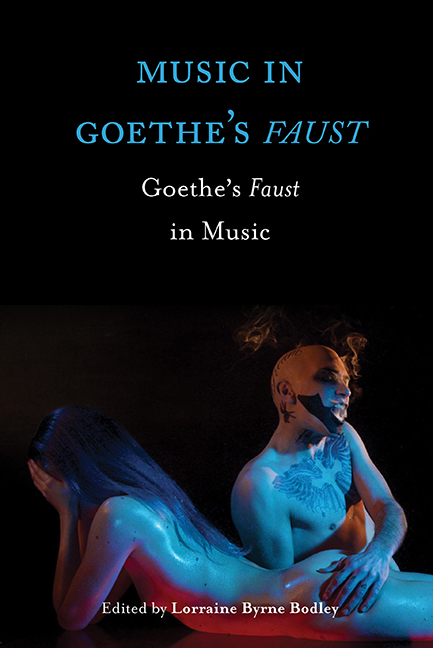Book contents
- Frontmatter
- Dedication
- Contents
- List of Illustrations
- Contributors
- Acknowledgements
- Abbreviations Used in the Notes
- Introduction. Rhapsody and Rebuke: Goethe's Faust in Music
- Part I Goethe's Faust: Content and Context
- 1 The Redress of Goethe's Faust in Music History
- 2 Wagering on Modernity: Goethe's Eighteenth-Century Faust
- 3 Reflectivity, Music and the Modern Condition: Thoughts on Goethe's Faust
- 4 Music and Metaphorical Thinking in Goethe's Faust: The Example of Harmony
- 5 Faust: The Instrumentalisation of an Icon
- Part II Legacies: Goethe's Faust in the Nineteenth Century
- Part III Topographies: Stagings and Critical Reception
- Part IV New Directions: Recent Productions and Appropriations
- Select Bibliography
- Index
4 - Music and Metaphorical Thinking in Goethe's Faust: The Example of Harmony
from Part I - Goethe's Faust: Content and Context
Published online by Cambridge University Press: 30 August 2017
- Frontmatter
- Dedication
- Contents
- List of Illustrations
- Contributors
- Acknowledgements
- Abbreviations Used in the Notes
- Introduction. Rhapsody and Rebuke: Goethe's Faust in Music
- Part I Goethe's Faust: Content and Context
- 1 The Redress of Goethe's Faust in Music History
- 2 Wagering on Modernity: Goethe's Eighteenth-Century Faust
- 3 Reflectivity, Music and the Modern Condition: Thoughts on Goethe's Faust
- 4 Music and Metaphorical Thinking in Goethe's Faust: The Example of Harmony
- 5 Faust: The Instrumentalisation of an Icon
- Part II Legacies: Goethe's Faust in the Nineteenth Century
- Part III Topographies: Stagings and Critical Reception
- Part IV New Directions: Recent Productions and Appropriations
- Select Bibliography
- Index
Summary
As chapters in this section make clear, Goethe's Faust presents a strikingly broad and detailed view of the world and the human condition. We are offered a vivid dramatic present, and also referred both backwards and forwards, to the cultural and historical past and to the emerging future, constantly forced to assess and reassess our perspectives. This chapter is concerned with the nature of Goethe's musical reference in the text. For ‘music in Goethe's Faust’ covers far more than settings or other performance music, in both content and context of the work. A substantial network of musical allusion within the verbal text cross-refers between episodes where music is played and sung, recalled, varied, repeated, [re]evaluated; thus creating and maintaining both synchronic and diachronic relations in Faust, and also setting up extra-textual points of reference.
Music can function in this way not because of what Goethe thought about music, but how. His comments on music seem inconsistent, even contradictory; but the nature of his thinking is remarkably consistent. He thought of music in terms of other things, and often also of other things in terms of music: that is, he thought metaphorically, by analogy. Goethe's musical reference in Faust has been puzzled over at least since the study by Helene Herrmann in 1916. But if we focus on his metaphorical thinking (i.e. not individual figures of speech, but the underlying analogies with music that beget figures of speech or figures in other media), new perspectives emerge on Goethe and on his work, especially on Faust. This has become possible through the development of metaphor theory. Currently part of cognitive linguistics, metaphor theory can present daunting terminology. But some of the recent insights it offers, and some of the earlier works on which it draws, reveal a great deal about metaphorical thinking and shift our perspectives on Goethe in very productive ways. Ernst Cassirer and Max Black, for example, stress that such thinking offers not a full picture, but vivid glimpses of perceived similarity between selected aspects of two fields.
- Type
- Chapter
- Information
- Music in Goethe's FaustGoethe's Faust in Music, pp. 73 - 85Publisher: Boydell & BrewerPrint publication year: 2017



